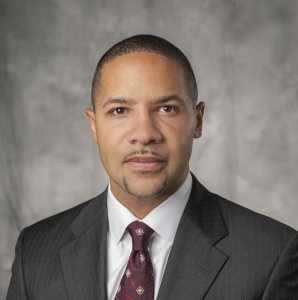Presented By: Aerospace Engineering
Chair's Distinguished Lecture: Challenges Predicting the Lifetime of Hall Effect Thrusters

Mitchell L. R. Walker
School of Aerospace Engineering
High-Power Electric Propulsion Laboratory
Georgia Institute of Technology
Electric propulsion devices are rapidly replacing traditional chemical rockets on spacecraft. Electric propulsion devices possess a combination of high specific impulse and high thrust efficiency that drastically reduce the mass of propellant required to perform a specific mission. Satellite operators leverage these characteristics to reduce the mass, size, and launch cost of a spacecraft while maintaining its payload capability. The drawback of electric propulsion is that the thrust level is limited by the electrical power available on the spacecraft. Thus, the required operational life of electric propulsion devices is thousands of hours.
The Hall effect thruster (HET) is a type of electric propulsion routinely flown on spacecraft. Currently, HET development requires expensive, high-risk, ground-based qualification tests that exceed 7,000 hours to demonstrate the necessary on-orbit lifetime. To date, modeling efforts have been unable to predict the dominant failure mechanism observed in HET qualification tests. In particular, how quickly does the accelerated plasma erode the ceramic HET discharge channel?
This presentation discusses an AFOSR-sponsored effort to develop a fundamental understanding of how the HET discharge plasma erodes the ceramic discharge channel. This knowledge will facilitate our ability to predict HET lifetime and will influence the design of future high-power HETs.
About the speaker...
Mitchell L. R. Walker is a Professor of Aerospace Engineering and Associate Chair for Graduate Studies at Georgia Tech. His primary research interests include experimental and theoretical studies of advanced plasma propulsion concepts for spacecraft. Dr. Walker received his Ph.D. in Aerospace Engineering from the University of Michigan in 2004. His research activities include Hall thrusters, gridded ion engines, diagnostics for plasma interrogation and thruster characterization, vacuum facility effects, helicon plasma sources, and plasma-material interactions. He has authored 130 journal articles and conference papers in the fields of electric propulsion and plasma physics.
Dr. Walker serves as the American Institute of Aeronautics and Astronautics (AIAA) Deputy Director for Space Rockets and Advanced Propulsion and as an Associate Editor of the Journal of Spacecraft and Rockets. He is also a consultant to the Air Force Scientific Advisory Board. Dr. Walker delivered expert witness testimony to the Space Subcommittee - House of Representatives, Washington, D.C. to help guide national investments in electric propulsion technology. Dr. Walker is a recipient of the Air Force Office of Scientific Research Young Investigator Program Award, the AIAA Lawrence Sperry Award, the AIAA Sustained Service Award, and the Georgia Power Professor of Excellence Award.
School of Aerospace Engineering
High-Power Electric Propulsion Laboratory
Georgia Institute of Technology
Electric propulsion devices are rapidly replacing traditional chemical rockets on spacecraft. Electric propulsion devices possess a combination of high specific impulse and high thrust efficiency that drastically reduce the mass of propellant required to perform a specific mission. Satellite operators leverage these characteristics to reduce the mass, size, and launch cost of a spacecraft while maintaining its payload capability. The drawback of electric propulsion is that the thrust level is limited by the electrical power available on the spacecraft. Thus, the required operational life of electric propulsion devices is thousands of hours.
The Hall effect thruster (HET) is a type of electric propulsion routinely flown on spacecraft. Currently, HET development requires expensive, high-risk, ground-based qualification tests that exceed 7,000 hours to demonstrate the necessary on-orbit lifetime. To date, modeling efforts have been unable to predict the dominant failure mechanism observed in HET qualification tests. In particular, how quickly does the accelerated plasma erode the ceramic HET discharge channel?
This presentation discusses an AFOSR-sponsored effort to develop a fundamental understanding of how the HET discharge plasma erodes the ceramic discharge channel. This knowledge will facilitate our ability to predict HET lifetime and will influence the design of future high-power HETs.
About the speaker...
Mitchell L. R. Walker is a Professor of Aerospace Engineering and Associate Chair for Graduate Studies at Georgia Tech. His primary research interests include experimental and theoretical studies of advanced plasma propulsion concepts for spacecraft. Dr. Walker received his Ph.D. in Aerospace Engineering from the University of Michigan in 2004. His research activities include Hall thrusters, gridded ion engines, diagnostics for plasma interrogation and thruster characterization, vacuum facility effects, helicon plasma sources, and plasma-material interactions. He has authored 130 journal articles and conference papers in the fields of electric propulsion and plasma physics.
Dr. Walker serves as the American Institute of Aeronautics and Astronautics (AIAA) Deputy Director for Space Rockets and Advanced Propulsion and as an Associate Editor of the Journal of Spacecraft and Rockets. He is also a consultant to the Air Force Scientific Advisory Board. Dr. Walker delivered expert witness testimony to the Space Subcommittee - House of Representatives, Washington, D.C. to help guide national investments in electric propulsion technology. Dr. Walker is a recipient of the Air Force Office of Scientific Research Young Investigator Program Award, the AIAA Lawrence Sperry Award, the AIAA Sustained Service Award, and the Georgia Power Professor of Excellence Award.